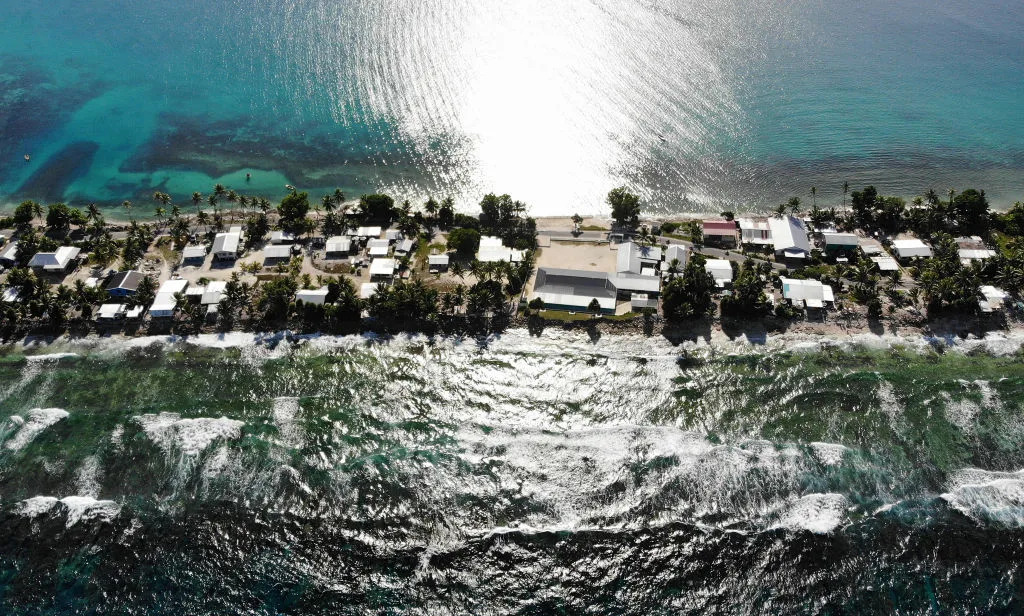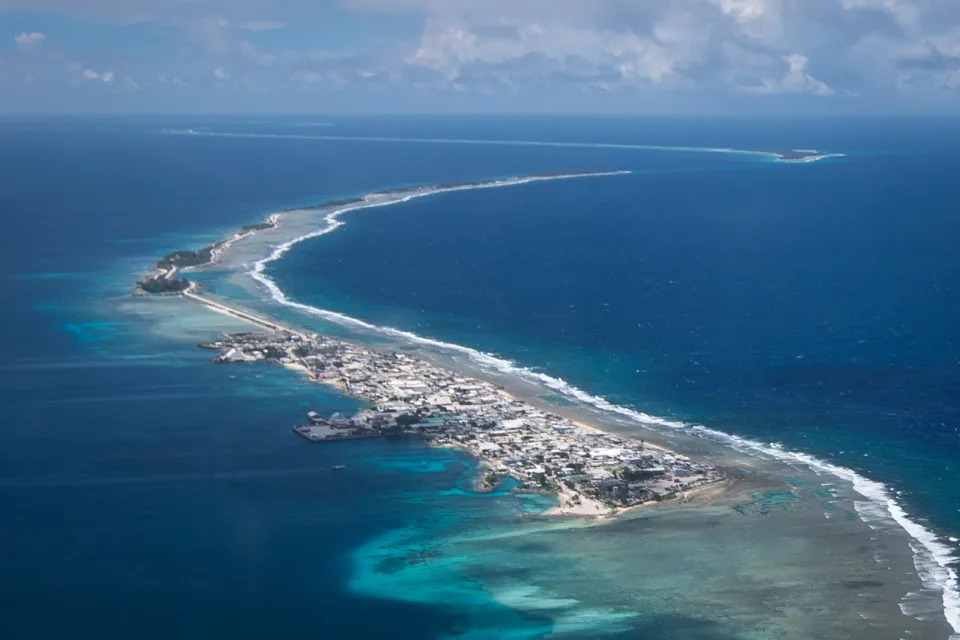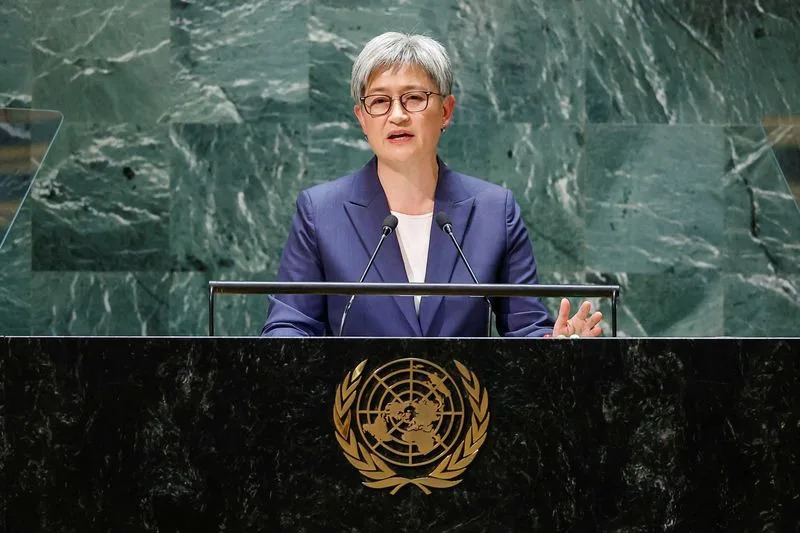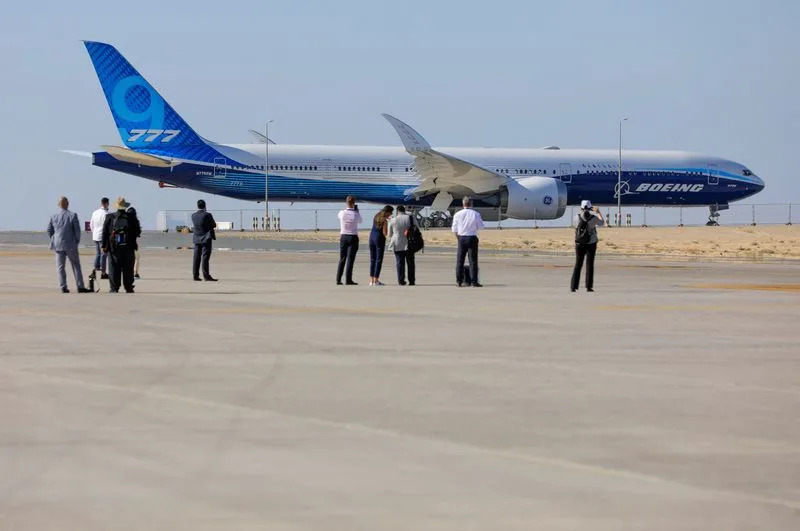Which islands will become uninhabitable due to climate change first?
Meg Duff
Sun, November 12, 2023

A horizontal aerial view of a thin occupied strip of land with buildings, with the ocean on each side.
About a million people live in coral atolls like those in the Maldives, Tuvalu, Kiribati, and the Marshall Islands. These islands are just a few feet in elevation, making them some of the places most at-risk from the rising seas that will result from climate change. Five uninhabited islands in the Solomon Islands have already vanished beneath the waves in the past century.
The Maldives, Kiribati, Tuvalu, and the Marshall Islands have the highest percentage of their land area at risk because they are all atolls; other countries also have low lying islands, but have more higher ground available to flee to.
So which low-lying islands will be underwater — and uninhabitable — the soonest due to climate change? As it turns out, that question is impossible to answer. Four islands illustrate why.
Mainadhoo, Huvadhoo Atoll, Maldives
First, scientists don't have accurate elevation data for many of these far-flung islands, and even if they did, that information doesn't predict when they will be submerged.
"Atoll islands are very dynamic places," said Geronimo Gussmann, a researcher at the Global Climate Forum. "They shift shape, they grow in elevation. They sometimes merge very quickly."
Related: Alarming collapse of Greenland ice shelves sparks warning of sea level rise
Sand can grow such coral-reef islands, a 2018 paper studying the island of Mainadhoo in the Maldives found. But islands get new sand from coral reefs, and global warming kills coral. At an extra 3.6 degrees Fahrenheit (2 degrees Celsius), 99% of coral reefs die. At 2.7 F (1.5 C), some corals remain.
Coral health will determine which islands can keep pace with rising tides.
Roi-Namur Island, Kwajalein Atoll, Republic of Marshall Islands

Aerial view of a ring shaped series of islets amidst a blue ocean
Islands also don't need to disappear to become uninhabitable. For one thing, when waves roll over low-lying islands, they contaminate fresh groundwater with salt. Higher seas mean frequent floods, and groundwater can't recover from daily or even yearly inundation: food trees die and water must be imported.
A 2018 paper in Science Advances analyzed flooding on Roi-Namur in the Marshall Islands. It predicted that most atoll islands will have no potable water by the 2060s (if global climate goals are not met) or by the 2030s if ice sheets collapse under the "worst case scenario" for climate change. Thousands of Marshall Islanders have already emigrated.
Mundoo, Laamu Atoll, The Maldives
Many islanders are adapting, even despite devastating floods, so just defining "habitable" is challenging. "It's poking the beehive," Gussmann told Live Science.
Just a few blocks wide at the widest end, the island of Mundoo in the Maldives boasts a school, beautiful beaches, and a number of sports teams. It is home to less than 200 people — but even that number is surprising.
In 2004, flooding decimated Mundoo and neighboring Kalhaidhoo. The government announced that both islands would be uninhabited moving forward — "Mundoo has basically received no public sector investments," Gussmann said — but many Mundoo families moved back. Islands without central government funding, Gussmann said, may become uninhabited first but political will can bring surprises.
Fongafale, Funafuti Atoll, Tuvalu
Urban islands receive more investment than rural ones, but they also face challenges. Tuvalu, the capital island of Fongafale, is home to about 4,000 people. By 2100, 95% of the island may flood during high tides.
RELATED STORIES
—The 'safe' threshold for global warming will be passed in just 6 years, scientists say
—We could be 16 years into a methane-fueled 'termination' event significant enough to end an ice age
—19 'mass extinctions' had CO2 levels we're now veering toward, study warns
To combat this, Tuvalu recently added artificial high ground on one side of the island. A long-term plan involves making the island about 50% wider, then eventually raising both sides.
But a 2022 analysis of multiple risk factors found that even these protection efforts may not keep islands habitable: declining ecosystems will hurt tourism, fisheries and islanders' abilities to fund solutions. The scale and speed of global efforts to limit climate change will make a tangible difference. Ultimately, which islands and island communities can remain will depend in large part on how the rest of the world responds.
Australia foreign minister touts Tuvalu security, migration pact
Reuters
Sat, November 11, 2023

78th UNGA General Debate at UN HQ in New York
SYDNEY (Reuters) - Australia's Foreign Minister Penny Wong said on Sunday that a security and migration pact signed with Tuvalu showed Australia was a "genuine, reliable" regional partner, as it seeks to counter China's influence in the Pacific.
Australia announced on Friday the security guarantee to the tiny Pacific Islands nation to respond to military aggression, protect it from climate change and boost migration.
Australia, a United States ally, has been working to shore up its Pacific standing amid a rising China, which recently upgraded a security pact with Solomon Islands.
"It is about Australia saying to the region and to Tuvalu, we are a genuine, reliable partner and when we say we are part of the Pacific family, we mean it," Wong told the Australian Broadcasting Corp, regarding the Tuvalu pact.
Asked if it was linked to China's activity in the region, Wong said: "We recognise we live in a more contested region and we have to work harder to be a partner of choice, we know that".
Under the treaty, announced in the Cook Islands by Australia's Prime Minister Anthony Albanese and his Tuvalu counterpart Kausea Natano, Australia will also vet Tuvalu's security arrangements with other nations.
Albanese has called the pact Australia's most significant agreement with a Pacific Island nation, giving "a guarantee that upon a request from Tuvalu for any military assistance based upon security issues, Australia will be there."
Tuvalu, population around 11,000, is one of just 13 nations to maintain an official diplomatic relationship with Taiwan, as Beijing has made increasing Pacific inroads.
A collection of nine low-lying islands mid-way between Australia and Hawaii, Tuvalu is one of the world's most at-risk countries from climate change and has long drawn international attention to the issue.
Reporting by Sam McKeith in Sydney;
Government officials refuse to cede ‘an inch of land’ amid rising threat: ‘This is something that we take very seriously’
Susan Elizabeth Turek
Sun, November 12, 2023

Approximately one-third of Singapore is situated less than 16 feet above sea level, and with rising waters affecting shorelines worldwide, government officials are taking action to protect over $50 billion in real estate.
“We are not planning to lose any inch of land permanently,” Ho Chai Deck, a deputy director at government agency PUB, told Bloomberg in October. “Singapore will build a continuous line of defense along our entire coast. This is something that we take very seriously.”
The iconic Marina Bay waterfront is reportedly an area that could be impacted by the effects of rising sea levels caused by heat-trapping gases produced by human activities, as is Jurong Island, which hosts several oil and petrochemical companies that, if affected, could release hazardous chemicals into the environment.
“This is a country more susceptible to sea-level rise than virtually any country in the world,” Nanyang Technological University professor Benjamin Horton said.
As detailed by Bloomberg, Singapore is utilizing a multipronged approach for success.
With the reclamation of land using piled-up sand, the use of the Marina Barrage — a dam with large pumps that drain extra water during intense rainfall and high tide — and the help of mangrove trees, Singapore has reportedly added more than 45 square miles of land while preparing for the future.
The country, like some other companies and initiatives, is also looking toward computer technology for assistance, collaborating with the Hydroinformatics Institute and National University of Singapore to build a model to help predict which areas are most at risk of flooding to protect not only the real estate but also human life.
“Both the Singapore Armed Forces and climate change defenses are existential. These are life-and-death matters,” Prime Minister Lee Hsien Loong said in 2019, acknowledging the challenges Earth’s changing environment presents, per Bloomberg.
With Singapore’s reported plans to spend approximately $73 billion over the next century on coastal and flood protection, the country’s multilayered approach also includes long-term dedication and vision, one attainable step at a time.
“Singapore wants to see if the technology is safe, and ensure everything is working well, before it takes the next step,” added JanJaap Brinkman, a director at water research institute Deltares and an adviser to Singapore.












